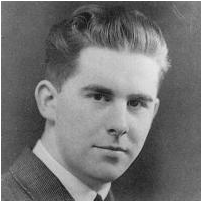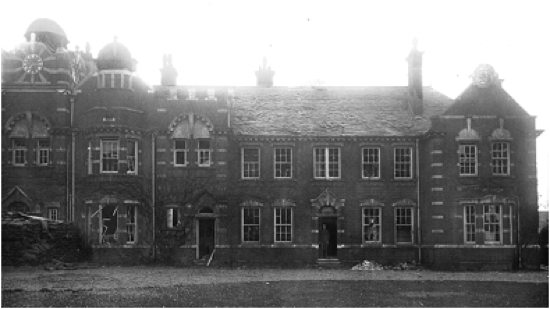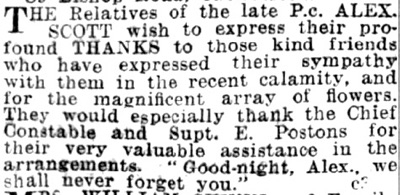Alexander 'Alex' Scott was born and brought up in Chigwell. He became a police officer with Essex County Constabulary in 1935. He married four years later. He was killed in an air raid while guarding Essex Police HQ. His home was in Springfield Park Road.
Alexander Simpson SCOTT, Civilian
Killed in an air raid aat Police Headquarters in Chelmsford. Aged 29
Blast from the device caused extensive superficial damage to the roof, windows and ceilings throughout Police Headquarters. The protective sandbagging was dislodged and corrugated steel sheets and other debris thrown across the courtyard. An early assessment reported that not a single window at headquarters had survived unscathed. Dozens of houses in the adjacent residential areas also suffered from the explosion.
At the time of his death Alexander and his wife's home was 93 Springfield Park Road in Chelmsford. His parents lived at Braeside, High Road in Chigwell.
Alexander left an estate valued at £273 3s. 3d. to his widow, who subsequently joined the Women's Royal Air Force. She then married a Scottish soldier, John Irving, and he was killed in Normandy in 1944. Alexander's widow married for a third time in 1951. In January 1994, a few weeks before her own death, she wrote:
"At 24 I married Alex Scott and we were to have eighteen months of wedded bliss. He was an all-round sportsman who was loved by all, a policeman based at headquarters where he was a wireless operator on the cars. The war was on and for a holiday we went to Chigwell to stay with his mother and father. After that we went on to Grays to a pal of Alex's from headquarters. When we returned to Chelmsford he had to go on duty. That was the last I saw of him.
That afternoon I went to the pictures to see a film but instead I slept through it. Going home, I felt something was wrong. During the evening a policeman came and told me that Alex had been killed. He took me to my mother who lived nearby. I went to bed and did not wish to get up. My brother came in and kept worrying me to go downstairs and eventually I did. I had such a caring family, eight brothers and sisters and of course, I can't forget my loving parents. Alex's mother asked if he could be buried at Chigwell so that is where he lies today.
The next thing was for me to get out. My brother-in-law and sister nagged me to go dancing with them and gradually I started to go out again. The only thing to do when you lose someone is get out again as soon as possible. It helps. A few months later I joined the WAAF and left Chelmsford. I was a wireless operator, as I had learned Morse code in the guides. I was so pleased when Alex was remembered at the memorial service at police headquarters in 1992. He was the love of my life and I've shed a few tears writing this. I still feel his presence sometimes, watching over me. When I look at his photograph I ask 'Why did it have to happen?".
George Henry Rookwood Totterdell, a detective superintendent in Essex County Constabulary, who lived near police headquarters later wrote about the bombing incident:
“I was at home when the air-raid siren sounded, and was about to leave to go to my office at headquarters. I stood on the front door-step of my house for a few moments watching the searchlights. Eventually they succeeded in getting one plane in the full beam, and the anti-aircraft fire became very intense.
The plane took violent evasive action to escape, and, as it appeared to have done so, I left and walked down the road towards my office. I was within twenty yards of headquarters buildings when I heard the screeching of a salvo of bombs coming in my direction, Instinctively I threw myself face downwards under an archway over the road. I started t count the bombs as they fell, and had reached up to five when I lost count. The archway was rocking, and debris was falling all around me.
I got up when the last of the sixteen bombs had fallen. Owing to the clouds of dust and the darkness, I was quite unable to see anything. I quite expected to find headquarters flattened and was surprised to discover that it had escaped with a near miss, though the Chief Constable’s house had been damaged.
I groped my way towards the main entrance of the building, normally guarded by an armed constable, and found there was a large crater near the entrance. Police Constable Scott, who was performing guard duty, was lying near by with terrible injuries. Continuing the search, I came across the body of my interpreter - Detective Constable Lee. He also was in a bad way, and both succumbed to their injuries.
If I had not stopped for these few moments on the step of my own house I too might have been killed.”
120504

Alexander 'Alex' Scott was born in Chigwell in 1914, the son of Herbert George Scott (1883-1954) and Annie White Simpson (1889-1974). He had a younger brother, Hector William Scott (1920-1998).
On 1st June 1935 Alexander joined Essex County Constabulary where he served as Police Constable 480. His first posting was to Grays. The following year Alexander became a motor patrol driver at Police Headquarters in Chelmsford, qualifying as a first class driver and wireless operator.
On 29th May 1939, aged 24, Alexander married Myrtle Evelyn Bayes at Chigwell. At the time his home was at Braeside, High Road in Chigwell. Alexander’s bride was aged 25 and lived at 19 Gainsborough Crescent in Springfield. Her father ran a
grocer’s in New London Road, Chelmsford. Ten years earlier Myrtle had been awarded the Daily Sketch Medal of Honour for meritorious achievement, conferred on her for rescuing a girl from drowning in the River Chelmer when aged 11.
When the Second World War began, traffic officers were armed with revolvers and given the extra job of guarding Police Headquarters. Teams of three men worked a 24 hour shift, taking it in turns to watch for fires and guard the front and back of the main buildings.
At 7.17 p.m. on 16th November 1940 Alexander was guarding Police Headquarters with a colleague Maurice George 'Dixie' Lee when, following an air raid siren, a number of German aircraft had appeared in the night sky above Chelmsford. One of the enemy raiders was captured by the local searchlights and targeted by intense anti-aircraft fire. As the pilot took violent evasive action to escape, his aircraft released the stick of bombs that fell in a line from Police Headquarters to fields adjoining Chelmer Road.
The first high explosive bomb blew up on the gravel forecourt of Police Headquarters almost directly beneath the clock and only a few yards in front of the main building. Although sand bagging around the ground floor absorbed much of the blast Alexander and Maurice were caught in the open close to the bomb. Alexander was killed instantly, whilst his 29 year-old colleague was grievously wounded and was to die soon afterwards at the Chelmsford and Essex Hospital.

